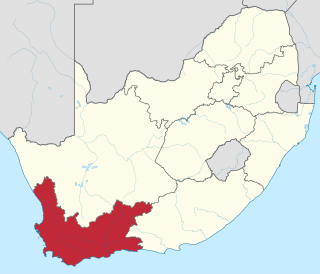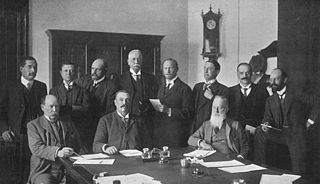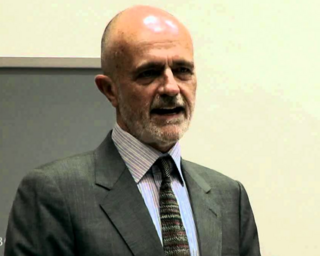
The Republic of South Africa is a parliamentary representative democratic republic. The President of South Africa serves both as head of state and as head of government. The President is elected by the National Assembly and must retain the confidence of the Assembly in order to remain in office. South Africans also elect provincial legislatures which govern each of the country's nine provinces.

South Africa is divided into nine provinces. On the eve of the 1994 general election, South Africa's former homelands, also known as Bantustans, were reintegrated, and the four existing provinces were divided into nine. The twelfth, thirteenth and sixteenth amendments to the Constitution of South Africa changed the borders of seven of the provinces.

The Western Cape is a province of South Africa, situated on the south-western coast of the country. It is the fourth largest of the nine provinces with an area of 129,449 square kilometres (49,981 sq mi), and the third most populous, with an estimated 7 million inhabitants in 2020. About two-thirds of these inhabitants live in the metropolitan area of Cape Town, which is also the provincial capital. The Western Cape was created in 1994 from part of the former Cape Province. The two largest cities are Cape Town and George.

The Constitution of South Africa is the supreme law of the Republic of South Africa. It provides the legal foundation for the existence of the republic, it sets out the rights and duties of its citizens, and defines the structure of the Government. The current constitution, the country's fifth, was drawn up by the Parliament elected in 1994 in the South African general election, 1994. It was promulgated by President Nelson Mandela on 18 December 1996 and came into effect on 4 February 1997, replacing the Interim Constitution of 1993. The first constitution was enacted by the South Africa Act 1909, the longest-lasting to date. Since 1961, the constitutions have promulgated a republican form of government.

At least thirty-five languages indigenous to South Africa are spoken in the Republic, ten of which are official languages of South Africa: Ndebele, Pedi, Sotho, Swati, Tsonga, Tswana, Venḓa, Xhosa, Zulu and Afrikaans. The eleventh official language is English, which is the primary language used in parliamentary and state discourse, though all official languages are equal in legal status, and unofficial languages are protected under the Constitution of South Africa, though few are mentioned by any name. South African Sign Language has legal recognition but is not an official language, despite a campaign and parliamentary recommendation for it to be declared one.
The Senate was the upper house of the Parliament of South Africa between 1910 and its abolition from 1 January 1981, and between 1994 and 1997.

Minister of Home Affairs and Another v Fourie and Another; Lesbian and Gay Equality Project and Others v Minister of Home Affairs and Others, [2005] ZACC 19, is a landmark decision of the Constitutional Court of South Africa in which the court ruled unanimously that same-sex couples have a constitutional right to marry. The judgment, authored by Justice Albie Sachs and delivered on 1 December 2005, gave Parliament one year to pass the necessary legislation. As a result, the Civil Union Act came into force on 30 November 2006, making South Africa the fifth country in the world to recognise same-sex marriage.

The South Africa Act 1909 was an Act of the British Parliament which created the Union of South Africa from the British colonies of the Cape of Good Hope, Natal, Orange River Colony, and Transvaal. The Act also made provisions for admitting Rhodesia as a fifth province of the Union in the future, but Rhodesian colonists rejected this option in a referendum held in 1922. The South Africa Act was the third major piece of legislation passed by the Parliament of the United Kingdom with the intent of uniting various British colonies and granting them some degree of autonomy. Earlier, the British North America Act, 1867 had united three colonies and the Commonwealth of Australia Constitution Act, 1900 had united the Australian colonies.

The Western Cape Provincial Parliament (WCPP) is the legislature of the Western Cape province of South Africa. It is located at 7 Wale Street in Cape Town.
Baaitse Elizabeth "Bess" Nkabinde is a former judge on the Constitutional Court of South Africa.
Catherine "Kate" O'Regan is a former judge of the Constitutional Court of South Africa. From 2013 to 2014 she was a commissioner of the Khayelitsha Commission and is now the inaugural director of the Bonavero Institute of Human Rights at the University of Oxford.
In South Africa, a provincial legislature is the legislative branch of the government of a province. The provincial legislatures are unicameral and vary in size from 30 to 80 members, depending on the population of the province. Each legislature is chaired by a Speaker and a Deputy Speaker.

The Twelfth Amendment of the Constitution of South Africa altered the boundaries of seven of South Africa's nine provinces. It also redefined all of the provinces' geographical areas in terms of the areas of district and metropolitan municipalities, and repealed the provisions introduced by the Third Amendment that allowed municipal areas to cross provincial boundaries. A number of the boundary changes were highly controversial and led to popular protest and court challenges.

The Thirteenth Amendment of the Constitution of South Africa re-enacted provisions of the Twelfth Amendment which the Constitutional Court ruled had not been validly enacted. These provisions transferred the Matatiele Local Municipality from KwaZulu-Natal province to the Eastern Cape province.

The nine provinces of South Africa are governed by provincial governments which form the second layer of government, between the national government and the municipalities. The provincial governments are established, and their structure defined, by Chapter Six of the Constitution of South Africa.

Fedsure Life Assurance Ltd and Others v Greater Johannesburg Transitional Metropolitan Council and Others is an important case in South African law, heard in the Constitutional Court on 18 and 20 August 1998, with judgment handed down 14 October. The bench was occupied by Chaskalson P, Langa DP, Ackermann J, Goldstone J, Kriegler J, Madala J, Mokgoro J, O'Regan J, Sachs J and Yacoob J. DJB Osborn appeared for the appellants, RM Wise for the first respondent, and CZ Cohen for the second, third, fourth and fifth respondent.
Christopher Nyaole Jafta is a judge of the Constitutional Court of South Africa.

The National Convention, also known as the Convention on the Closer Union of South Africa or the Closer Union Convention, was a constitutional convention held between 1908 and 1909 in Durban, Cape Town and Bloemfontein. The convention led to the adoption of the South Africa Act by the British Parliament and thus to the creation of the Union of South Africa. The four colonies of the area that would become South Africa - the Cape Colony, Natal Colony, the Orange River Colony and the Transvaal Colony - were represented at the convention, along with a delegation from Rhodesia. There were 33 delegates in total, with the Cape being represented by 12, the Transvaal eight, the Orange River five, Natal five, and Rhodesia three. The convention was held behind closed doors, in the fear that a public affair would lead delegates to refuse compromising on contentious areas of disagreement. All the delegates were white men, a third of them were farmers, ten were lawyers, and some were academics. Two-thirds had fought on either side of the Second Boer War.

Wim Trengove SC is a South African advocate best known for his role in the development of South African Constitutional jurisprudence and his involvement in high-profile political cases.

Cape independence - also known by the portmanteau CapeXit - is the political movement to make the Western Cape province, and often other regions of the Eastern and Northern Cape provinces, an independent state from the rest of South Africa.











